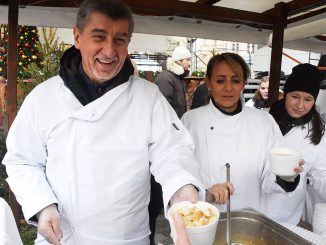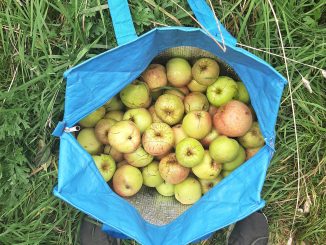“I stood there, I couldn’t do anything else”
How do you get an organic farm off the ground with an agri-giant operating in the neighbouring field? Coming back to the land after a high flying career in New York City, Libor Kožnar expected the first year to be the hardest. What he didn’t expect was to find himself in a legal dispute with Agrofert, the sprawling agribusiness empire founded by the Czech prime minister. Before returning to his roots in the Czech Republic, Libor had worked as a project manager in New York’s high-end construction sector. He started the “living farm” in January 2017, growing organic wheat, fruit and vegetables on a small holding in the heart of South Moravian wine country, not far from the Austrian border. The first year was tough but he stuck with it. In 2018 Agrofert moved in next door.
In this interview for ARC2020, Libor Kožnar tells us how he lost the organic certification for his wheat in April 2019 after Agrofert spread fertiliser on his field. In a second incident in October 2019 Libor captured video footage of an Agrofert planter sowing on his land.
You’re a small farmer minding his own business. How did you end up in a legal dispute with Agrofert?
Agrofert damaged our fields. They ploughed the mud road next to our field. They planted their seeds in it. They started farming all the way to the edge of our field. And when they applied NPK nitrogen fertiliser they spread it about five metres on our field. So we right away called for an inspection and we lost our certification for that block of land. We were in communication about that and it wasn’t going anywhere until the media stepped in. Seznam came and they made a little video about it and Deník Referendum wrote a nice detailed piece about what happened and who is Agrofert, what they do and who we are. And that put pressure on Agrofert and suddenly they start offering us restitutions for the damage.
In this video made in November 2019 by news server Seznam Zprávy, Libor Kožnar shows the damage done to his land by Agrofert. An Agrofert spokesperson can be heard denying the company entered Libor’s land. The spokesperson admits that fertiliser was accidently sprayed onto Libor’s field due to adverse weather conditions. Libor’s own footage of a second run-in with Agrofert can be seen at 1:22. The Agrofert spokesperson denies sowing seeds on Libor’s land.
And what’s the situation now? Do you know if and when you’ll be paid compensation, and how much?
They gave us a deadline by which they were going to compensate us. They missed the deadline and we are pretty much uncertain of what’s gonna happen and if they’re gonna pay us.
What will you need to do to restore the organic certification for your wheat?
What happened was we had multiple crops on those five hectares and they destroyed only a little strip on the side of the land and damaged only part of one species of wheat. They didn’t touch any of the other crops. So what we’ve done, we’ve split the field into a number of blocks [ed: land parcels in LPIS]. So the certifying organisation came again and they started the process of reinstating the former certification for the land which was affected by nitrogen. They went back to the beginning of the certification period. The transition time for annual crops is two years.

You had a second incident with Agrofert more recently. Can you tell us what happened?
Yeah. They cultivated the mud road again and they planted wheat this season in it. And when their huge tractors were planting the wheat, they planted it in our field as well.
And they were planting their own non-organic wheat in that field?
Yes, and most likely chemically treated seeds.
Is there anything you could have done to prevent this incident?
I was there. I stood there, I spoke to the tractor driver. Those tractors are so big, huge machines with huge equipment. And then I stopped the guy. He told me: “I’m just driving by the computer”. He went by what they have in the LPIS. Whatever is in the map, the tractor follows it by the GPS. He’s not able to apply the human factor. So he just sits in the tractor and he follows the line, whatever he’s ploughing through. And he ploughed directly through all the mud roads, the access roads for the field and he planted wheat there. So I couldn’t do anything else.
In November the New York Times ran an expose of EU farming subsidies. Do you think subsidies under the current CAP are – as the New York Times claims – emboldening strongmen, enriching politicians and financing corrupt dealing?
When I was in Connecticut State University they used to teach us how to read articles in the New York Times and the Wall Street Journal. Most of the articles are informing the financial institutions and Wall Street and people in power who create policies, to tell them about something else: there is a market opportunity, or somebody is doing something which might be interesting for other companies. They used to tell us at the university how Europe is awful because they have those subsidies and it’s uncompetitive and it’s not fair. They compared it often to OPEC, a cartel you know, because the European Union has the subsidies and it’s putting the US farmers out of competition.
It is true that the European Union is heavily subsidising farmers, giving them a competitive edge. The US could do the same thing but they don’t. They subsidise heavily the military. And the European military industrial complex cannot compete with US military companies. You cannot have the cake and eat it as well. So they are complaining: “Hey, you are subsidising heavily agribusiness – or agriculture – and our company is Cargill.” Or Monsanto. Actually not Monsanto anymore. Bayer. A German company as well. So they have huge multinational companies and they have corruption there as well. They complained in this article about companies and corruption in Hungary. The oligarchy of agribusinesses in the US are just as bad. There is no space for a mid-sized farm. And farms which by European standards are considered huge – thousands of hectares – in the US they can’t compete against those huge companies like Cargill.
So when I read that article in the New York Times, I read it as giving them leverage to push the European Union again on subsidies.
The subsidies are supposed to help small farmers. The large farmers are the market, they dictate the market. The small farmers need to catch up with them. There are two types of subsidies. One is per hectare: if you have 10,000 hectares, you’re supposed to receive only up to €400,000. In Czech they removed many of those regulations which concern the large companies and the limits for them. So we don’t have the same conditions they have in Austria or France or Germany.
Then there are subsidies for technology. The smaller you are, the more percent you get in subsidies. Most of the micro-businesses about the size we are – I think up to 10 people – receive about 50% subsidies. Which is helpful. Any of these wineries around here are micro-businesses, father and son. Most of them say, if it wasn’t for these subsidies, they wouldn’t exist. They wouldn’t have a plough, they wouldn’t have a rotor tiller, they wouldn’t have a cultivator.
They mentioned in the article that Hungary and Czechia removed those limits on financing and subsidies. It’s supposed to be helpful for farmers. It means the bigger you are, the richer you are. And that’s not what the subsidies were meant for.

Does Czech and EU law provide sufficient protections for small-scale eco-farmers like yourself?
No. The way it is structured right now, the common system of growing is conventional –that’s normal. If you are an organic farmer, in the field it is you who has to adapt to what is the norm. You have to move back from the neighbouring fields, from those who are spraying or using synthetic applications. When an accident happens like what happened to us, there is no protective system for us. There are laws when your pesticides go on somebody else’s land and you get a fine. But there isn’t any legal precedent like in the US, that your material has illegally trespassed on my land and damaged my crops.

You were inspired to come home and start a farm by buying produce at farmers’ markets in NYC. Do you think it’s easier to be a small-scale farmer in Europe or in the US?
Neither. Each of those markets have different challenges. Being in the US it’s so nice to be there and enjoy the benefit of the empire, that the oil comes from the cheap land, and the plastic and greenhouses and high tunnels are cheap. Everything is cheap. Lawnmowers are cheap because it’s made in cheap countries by people we don’t appreciate and pay enough. For a small farmer it’s easier to get access to technology and materials.
Access to GPS navigated tractors or a digital greenhouse, that’s a little bit complicated for us here. But we have those subsidies for small farmers which I have to say, they are very helpful. They help small farmers left and right. They say they wouldn’t be able to function the way they used to function – using market value without any subsidies. They wouldn’t be able to save up money for storage or anything else and have a shot at competing with those large guys.
Man, I wish they had those subsidies in the US. Because there are so many inventive farmers and they need that money for developing. And there are so many young people just starting their farms and they don’t have the money.
They have the money here but we don’t have the small farms and we don’t have farmers and people don’t have access to the land. We have the money but we don’t have the farms [for it] to be used on.
If you were EU Commissioner for Agriculture, what would you change about CAP?
I don’t know what I would change. Definitely I would try to set the caps and cut-off points for the large companies as not voluntary. And for countries to adapt and amend and then ratify their own conditions, but as something solid, set in stone, which cannot be modified and ratified differently as Czech has done.
I see that it helps small farmers, to put them on their feet and help them to buy technologies as we don’t have enough farms here. South of Brno, those 50 km between Brno and Austria, in any radius 50 km left and right there is no other farm like ours which is growing a full spectrum of vegetables. And it’s sad. I wish there was another farm. We are a teeny tiny farm, we are not able to cover the market. The demand is so huge. There is so much room for other businesses and other farms. And there isn’t anybody because it’s hard, it’s difficult. I mean it is hard, it is stressful. And you cannot start. And even if you find another farm, the people who have energy they don’t have access to the land because nobody wants to sell land or lease land. So there isn’t anybody.
This interview has been edited and condensed.
We invited Agrofert to comment on this article. Press spokesperson Karel Hanzelka sent us the below response in Czech. At his request we have translated it into English using Google Translate.
‘It is necessary to distinguish two different situations that occurred in this locality – spring and 2019 and autumn 2019:
SPRING 2019:
• We did not enter any agricultural property of Mr. Kožnar.
• Unfortunately, the application of fertilizer to our plots caused a minimum amount of fertilizer to fly to the edge of its soil block due to weather conditions.
• It was not an intention, but an influence of the weather. Such situations are common in agricultural practice.
• We apologized to Mr Kožnar, Mr Kožnar accepted the apology but did not claim any damages.
• We learned about Mr. Kožnar’s claim through the media; and in January, Mr. Kožnar added the documents. According to the conclusion of the insurance company, we will continue negotiations, especially if the insurance company refuses to pay due to the insured’s guilt.
AUTUMN 2019:
• The description of the situation does not correspond to reality. We didn’t plant any seeds on Mr. Kožnar’s land.
• As for the agricultural dirt road, it is historically unused and we have it in the cultivated land block according to LPIS land register. This land block was taken over from the previous user in autumn 2018 in the current borders. So we didn’t observe anything.
• Mr. Kožnar did not intervene in his land block. During the autumn sowing, only our agricultural equipment was turned on the edge of Mr. Kožnar’s neighboring land. There was nothing sown on this land. Neither did we observe or send anything on this neighboring property.
• Mr. Kožnar did not suffer any damage. Still, we apologized to him.
• We are in contact with Mr Kožnar, we are talking together. We have agreed to create a 4 meter wide protection zone between our soil blocks.
• Agriculture is not microsurgery or precision engineering where it is hundredths of a millimeter. Indeed, similar situations are common in agricultural practice.
We do not know why Mr Kožnar has a need to address through the media situations that are common in agricultural practice and are normally dealt with in a neighborhood agreement.'”
More on Czech on ARC2020
Bad Czechs and Balances: Commission Audit Confirms Czech PM in Conflict of Interest
Czech Republic | “No Forests, No Water, No Future” – Part I: Bugs in the Ecosystem
Czech Republic | “No Forests, No Water, No Future” – Part II: Moving On from Monocultures






